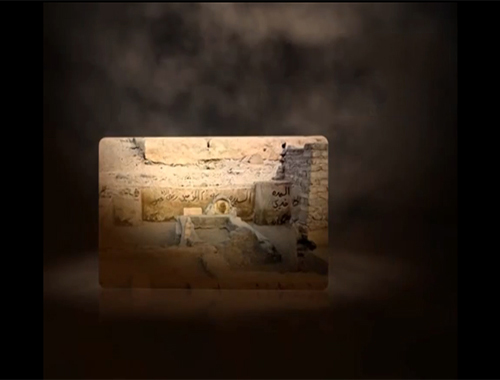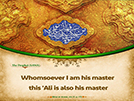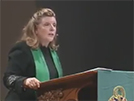Chapter One: Proof of God in Greece
- Details
- Hits: 4132
Section One: Proving God
--------------------------------------------------------------------------------
Chapter One: Proof of God in Greece
Introduction
Before entering into discussion we remind you of two points. Firstly we shall project a general outlook over the Geek culture and then present some of the similar opinions between the Greek and divine beliefs.
1) If we wish to present a general analysis of the Greek civilization perhaps we can say that the Greek civilization started with fantasies and passed through the stages of intellection and intuition and finally ended in religion. In the beginning, the people of Greece with fantasies reached to a legend. Later they rationalized the various disillusioned and sceptical philosophies and still further they turned towards mysticism and finally accepted religion.
However the Greek fantasies did not grow at one stroke but was precedented to the past matter. This past matter, which the Greek fantasies, started dominating in that was the divine Fitrat (innate nature) and the reflections of the past religions. Therefore the most important matter which is set forth in the period of fantasy is the matter of Gods and divine myths.
It was when the Greek fantasies started to dominate over this pure divine Fitrat that the matter of gods was mooted. The next stage was rationalization but the rationalization too was precedented to the past matter, which was the same previous fantasies. The fantasies were refined in the filter of rationalization and as an example, the gods in the eyes of Aristotle were transformed to the “first stimulant” or the “intellect” and or the “reasons” in Aristotle and “examples” in Plato replaced the gods.
As far as the human intellect precedented to the fantasies did not have the ability to give reply to all the human affairs, the inclinations in the later periods were towards discussions in morals or scepticism.
The next stage was inclination towards intuition (divine vision) and mysticism. In this stage, the reasoning found purification in the filter of intuition and as an example the first stimulant; intellect and separable being in the view of Plato got transformed to “the (Absolute) One”, the “Supreme being” and “indescribable peak of thought and reflection.” The negative philosophies of Plutonism was the last of the endeavors of Greek Culture in theologies and gnosis and here the Greek civilization came to an end and the religion of Christ came into existence.
Just as this stage appeared in Greece after the Jewish religion in the same manner after the Christian religion too it took shape in another form in the middle century which lasted till the appearance of the Last Prophet and the religion of Islam.
The famous historian of philosophy Kapilstan says: “From the time when thought and semi-scientific and semi-philosophical research of the cosmologists replaced wisdom, counsel and (seven) maxims of the wise and the myths of the lyrists, one can say that philosophy (in any logical state) took the place of art. This philosophy reached its climax at the time of Plato and Aristotle and finally succeeded to its highest level of ascension, not in mythology but in mysticism” (Fredrik Kapilstan - History of Philosophy)
Will Durant, about the Greek Civilization says: The religious and philosophical campaign had at present seen three stages: Attack to religion like the period before Socrates, endeavour on the path of substituting religion with the natural fantasies like the period of Aristotle and Epicures and finally returning back to religion in the period of sceptics and Stoic philosophers. This movement eventually ended in neo-Platonism and Christianity. Such kind of sequence has taken place many times in history and perhaps today too it is in the state of coming into existence…” (Will Durrant - History of Civilization, old edition vol. 6, and Pg. 270)
2) A few similarities can be seen between the Greek beliefs and the divine beliefs, which for justifying that some of the viewpoints have been explained.
One view is this that the Greek culture has derived benefits from the past religious especially from the teachings of Jewish religion, but of course with changes, which are the specialties of the Greek culture. Regarding this, we mention some of the testimonies:
Kapilstan says:
“It was the Jews who alleged that the eminent Greek philosophers with their important thoughts and reflections were greatly indebted to the holy book.” (Kapilstan: History of Philosophy Vol. 1. Pg. 636)
“Piloon” who was the fascinated one among the Greek philosophers believed that both in the Greek philosophy and in the holy book and tradition of the Jews one can find a unique reality while he was of the opinion that the philosophers have taken advantage of the holy books” (Kapilstan: History of philosophy vol.1 Pg.636)
Pilooyunus (from the neo-Platonists) was of the same view that Plato has taken his view that Plato has taken his wisdom from the fine books (Pentateuch) [Old Testament]. (As above Pg. 670)
Huze Nufisaguri & had a close relation with the religious life of that time. Apparently, in Alexandria e the place of conjunction and meeting of the Greek philosophers, exclusive knowledge and Oriental religion has come into existence. (As above Pg. 618)
Will Durant says: “In the entire tempests and disturbances of this period, the Jews preserved their patrimonial love for knowledge and devoted more than their required share in literature persistent in this period. Some of the most sublime parts of the holy book belongs to this period The Greek Jews, mostly in Alexandria and partly in other East Mediterraneancities wrote masterpieces like the “Book of Jama'e” (Society book), “Prophet Daniel”, some parts “proverbs”, “Zaboor of Davood” and some greater portion of the Unknown Principle in Arabic, Hebrew and Greek languages. The scholars used to interpret the verses of Torah in to Hebrew language d schools were opened for teaching the book of principles of Torah and analyzing its moral standards for the ever-increasing young generation.” (Will Durant-History of Civilization old edition; vol. 6. Pg. 198 onwards)
This recommendation was strengthened in the middle century by students of Yustin, Tatiyanus and the philosophers after him. However, another justifications, which was set forth in the middle centuries was the matter of 'Logos'.
Yustin who was a Christian scholar, by making use of the Gospel of John would say: “Isa Messiah is a word (logo) and the word of God … and the word of anyone who comes in this world it illuminates its luminosity. So one can conclude that it is possible to achieve faith in God through natural revelation of divine word before it is incarnated in the body of Isa and confessed among us.” (Aten Thelson - The spirit of philosophy of the middle century)
Laaktanteyus a Christian scholar believed that Socrates, Plato and Sankara have said many good things and in fact each one of them attained a part of the whole reality & However, the main point is this that no one can distinguish the truth from falsehood in the beliefs of the philosophers unless if he has recognized the reality from before and no one can recognize the truth from before unless if God has taught him through revelation. (As above Pg. 43)
Some of the Christian scholars like “Arigen” too have reckoned reason to be similar to “word” and Isa Messiah and consider that to be dependent on the Divine Essence. Anyhow our purpose over here is to describe the dividing points of Greek philosophy from religion.
Proof of God in Greece
“Greece at the time of Plato was the fountain-head of such practice which according of God and accepts the proof by means of reasoning” (A. J. Arbari - Reason and revelation in Islam)
Among the evident specification of Greece was independent reasoning in achieving the realities and one of the realities too was God. This independency of reason can be seen in different ways in Greece and perhaps before Greece and basically in every kind of human and non-religious reflection. However it entered a new phase through Socrates. He revolted against devouteness in morals and wanted to establish a rational morals.
“The majority of the people of Athens were suspicious of Socrates. The religious-minded people reckoned him to be the most dangerous of the sophists because he was against every kind of religious ceremonies and celebrations. However he reflected the ancient religion and wanted every law to be weighed accurately with the yardstick of reason.” (Will Durant - History of Civilization; new edition; chapter 16; Pg. 416)
The method of Socrates reasoning was a special one which, reached its perfection at the time of Aristotle and it is here that some have reckoned Socrates to be the founder of philosophy. However, before describing this method we should pay attention to its principle and root.
Perhaps one can find the special independancy of “reason” in the views of Heraculitis. He was the first person to emphasize on this matter that the perceptible things are always in the state of change. Even if the philosophers before him had comprehended this reality yet it was he who emphasized this matter and his fame too was mainly due to some sentences, which he has explained in this regard. For example the sentence: “You cannot keep your foot twice in one river because the fresh water is constantly flowing and passes from you.”
Aristotle narrates that Heraculitis said: “All the perceptible things are always in the state of flux and no knowledge or recognition is connected to them.” (Aristotle - Metaphysics)
The result of this view is that rational knowledge and recognition is having no concern with the perceptible things and the affairs belonging to the material world and one cannot recognize the perceptible things except if we remove it by some means from its materialistic and trivial state and give a non-material aspect to it. This affair was fulfilled in Greece through separation of the universal concepts from the particular ones. The Universals with all its kinds form the basis of Greek knowledge. It is only the abstractional affairs, which are constant and “reason” encompasses them.
Therefore, the only means for recognizing the world is the Universals. Perhaps the first person who put into Operation the beliefs of Heraculitis was Socrates. He (i.e. Socrates) who was living during the time of sophists seeked to find a solution for the doubts of the sophists. “The sophists recommended the theory of relativity and denied all things which possessed the required and universal consideration. However Socrates paid attention to this reality that the Universal concept remains uniform. It is possible that the particular ones undergo change but the meaning remains constant”. (Kapilistan- History of Philosophy; vol.1; Pg.149)
The main aim of Socrates was to describe a blissful and ethical life and he would fulfil this task by resorting to the Universal definition of ethical virtues. He reckoned the source of these definitions to be the human soul. However he believed that one could have access to the Universal definitions only through reasoning and dialogue.
In the beginning, he would with utmost skill place the opposite person to self-contradiction and manifest his mistake for him. Thereafter he would assist him in following the matter by himself and in discovering the truth. Dialogue and Dialectic would begin from a “less adequate” definition and move forward to a more adequate definition and or move forward from observation and examination of trivial cases to a Universal definition. Sometimes he would not reach to any decisive conclusion in practice but nevertheless his aim was one: i.e. searching one correct and Universal definition. (As above Pg. 152)
Therefore, Aristotle says that there are two advancements in knowledge which we can truly attribute them to Socrates; putting into effect the inductive reasoning and the universal definitions. (As above Pg. 149)
“Plato” who became acquainted with the beliefs of Heraculitis through “Kratulus” (one of the followers of Heraculitis) accepted his view that the perceptible things are constantly in the state of revival and becoming (process) and no type of knowledge and recognition is having attachment with the perceptible things. He also accepted the view of his teacher Socrates that probe and definition is through the Universals.
Plato who reckoned on the one hand the perceptible things to be variable and thought on the other hand that recognition is possible through invariable and general affairs, came to this view that the Universals are existing in another world called the world of “exemplary ideas” These Universals or exemplary ideas are abstract and fixed affairs which exists in another world separate from the perceptible things. On the other hand, the perceptible things are existing by virtue of benefiting from the exemplary ideas and the actual recognition of one thing is in reality the recognition of its abstract example.
Aristotle accepts the recommendation “Ma'refat” (gnostic knowledge) through the Universals from his master Plato. However he does not believe that there is another existence for the Universities separate from the perceptible things. According to Aristotle, “the reasoning by virtue of which it makes possible and explains the view of Plato about rational knowledge, only proves that Universal is a reality and fantasy and illusion is not for the mind. However it does not prove that the Universal is separated from the abstract things, life and innate order.” (As above Pg. 401)
On the other hand, he finds many faults about the view of exemplary ideas. Therefore Aristotle while accepting this mater that knowledge is connected to the Universal and searches the Universal in the perceptible world, yet perceptible, abstract and multiple are not due to the multiplicity and greatness of the Universal. Thus every thing should be having a Universal aspect which the responsibility of the philosophers is to detach that Universal.
According to Aristotle, Universal is not merely a subjective concept or a state of literal definition. Rather, like the Universality in mind a specific essence exists in the perceptible things even though this specific essence is not immaterial and separate from the perceptible things. This specific essence which is having one kind of existence in a person is a real foundation for the separable Universal which is having a numerical unity in mind and it can without any difference be the carrier of all grades of parts. The matter of existence of common genus in species too is expound in the same manner until we reach to the genus of genera which the highest of that is not the genus which can be indifferently conveyed over the lower genus. This genus of genera is of the same category, which according to Aristotle is ten and is named as the ten categories. In this way we reach the species, genera and categories.
Similarity, by paying attention to the various species, the concept of reason apart from separating the common aspects between them which were genus, also separates the uncommon ones which are differentia and by combination of common factors and the distinguishing factors i.e. genus and differentia it achieves a universal meaning of one kind.
Therefore, for recognizing the quality of a person, firstly by way of theafore-said separation, we come to know the kind of that person but yet the quality of this kind is unknown. So by the same method we attain the genus and differentia and by combination of the two known universal (genus and differentia) we attain the unknown (definition and quality of its kind). By this method we will be successful in discovering the quality of things.
This matter was true to imaginations. However with regard to confirmations i.e. certifying the attribute for the proposition, we first gather together the elementary materials i.e. a number of known suppositions and then we keep two self-evident propositions and two known confirmations (which carrying the attribute upon the proposition in them is self-evident) next to each other in a special form till we reach to the third case which was unknown. Here we will succeed in proving the unknown proposition.
From the above matter it becomes clear that making use of the Universals for proving an affair requires a special method. The Universals as per special rule, are classified and by means of combination of these Universals we come to the propositions and by combination of the propositions we will, by following rule, have access to the rational proofs and reasoning and will discover the unknown proposition.
Therefore, for making use of the Universals special logic is required which Aristotle succeeded in discovering this logic. As a result, by compiling his logic and while making perfect Heraculitis beliefs, Aristotle presented the method of rational proof and by making use of this logic and the capital of Universals he himself produced a rational system which according to him was in conformity with the concrete and external system. So henceforth, for every claim a proof was to be presented which would be in agreement with the scale of Aristotle's logic. In the view of Aristotle and other philosophers the existence of God too was a claim, which needed philosophical proofs and before establishment of that, the philosophers were having no right to believe in the existence of God.











